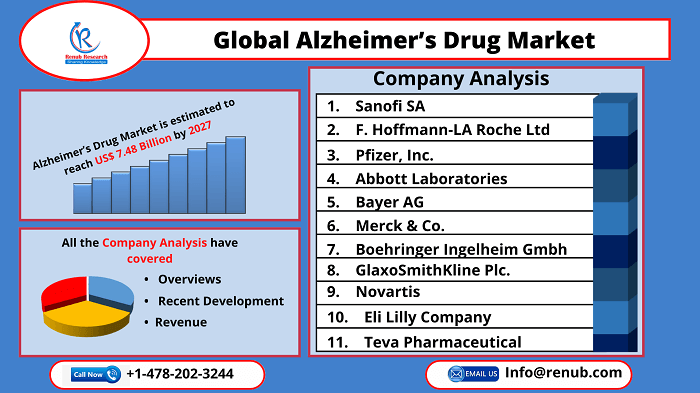Global Alzheimer's Drugs Market will be USD 7.48 Billion by 2027, Due to Rise in Awareness of the Disease, and Increase in the Healthcare Spending
23 Jan, 2023
According to Renub Research latest report “Alzheimer's Drugs Market, Global Forecast 2023-2027, Industry Trends, Growth, Insight, Impact of Inflation, Company Analysis” Alzheimer’s Drug Market is estimated to reach US$ 7.48 Billion by 2027. Approximately 50 Million people had Alzheimer’s disease in 2021, and around 10 million new cases are added each year, as per the World Health Organization (WHO). A neurodegenerative progressive condition, that means the signs progresses over many years and gradually worsens. It is the most common cause for dementia. There is no one reason for the cause Alzheimer’s disease, the disease can be caused by a combination of genetic, lifestyle, and environmental components that affect the brain over a time period. Women are more likely to get Alzheimer’s disease in comparison to men. The rise in awareness of the disease, and increase in the healthcare spending globally, is anticipated to add to the growth of the Alzheimer’s disease Drug Market.

The growth in special identification from the regulatory authorities is one of the major contributors to the growth of the market. Also factors like increasing expenses on healthcare infrastructure, growth in public awareness about Alzheimer’s in developing regions, and surge in the strategic association rate among the key market players, will contribute to the growth of the market.
Furthermore, increase in age and aging global population also affects the Alzheimer’s disease drug market greatly. According to World Population Prospects (WPP), in 2017, an estimated 962 million people were aged 60 or above, which contributed for 13% of the population worldwide. By 2030, the number is anticipated to reach 1.4 billion.
Donepezil Drug has dominated the overall market share:
By Drug class is The Alzheimer’s disease drug market segmented into; Donepezil, Galantamine, Rivastigmine, Memantine, and Others. Donepezil drug has held majority of the market share, the key reason for the growth of the drug’s usage is the best pharmacological treatment options it provides in terms of cognitive improvement. Donepezil has a response rate of 40%-58%, with a side-effect rate of 6%-13%.
Homecare setting will see a significant rise during the forecast period:
Based on End-user the Alzheimer’s disease drug market is categorized into; Hospitals, Clinics, Nursing home, and Homecare setting. Homecare setting has emerged as an alternative to a hospital stay, as it is a less expensive means of treatment. Alzheimer’s disease worsens with age, it makes day-to-day living more difficult with time.
Homecare setting can assist in monitoring symptoms, performing check-ins, and procuring periodic communication to lessen preventable hospital readmissions. The above factors are the major contributors to the growth of the homecare setting category of Alzheimer’s disease drug market. However, the hospital category dominated the market share, owing to the increase in hospitalization of the elderly population and Alzheimer’s patients.
Alzheimer Disease Drug Market was at US$ 6.54 Billion in 2022:
Focusing on the region, the Alzheimer’s disease drug market is divided into; North America, Europe, Asia-Pacific, and Rest of the World. According to Alzheimer’s Disease International in 2012, there were about 21 million older individuals, and the number of patients suffering from Alzheimer’s is expected to be around 518,000 by 2024, adding to the growth of the Indonesia Alzheimer’s disease drug market. In 2015, Alzheimer’s Indonesia had launched a project called Dementia Friendly Jakarta with the governor’s support to tackle the Alzheimer’s disease problem.
The key reason for Asia-Pacific region’s growth is the increasing understanding among the common people regarding healthcare, and the rise in research projects for the development of medicines to cure Alzheimer’s disease. Therefore, the Asia-Pacific region is anticipated to show a significant growth during the forecast period.
However, North America has dominated the market share, due to the growth in the research activities for the treatment of Alzheimer’s disease, and the increase in geriatric population. Furthermore, In June 2021, Biogen and Eisai Co. Ltd's product lecanemab (BAN2401), an anti-amyloid beta protofibril antibody for treating Alzheimer's disease, was approved by FDA in the U.S. Moreover, increasing government initiatives and funding are expected to boost the market's growth.
Competitive Landscape:
The market for the Alzheimer’s Disease Drug Market is categorised into; Sanofi SA, F. Hoffmann-La Roche Ltd., Pfizer, Inc., Abbott Laboratories, Bayer, Merck & Co., Boehringer Ingelheim GmbH, GlaxoSmithKline Plc., Novartis, Eli Lilly and Company, and Teva Pharmaceuticals.
Market Summary:
- Drug Class - Alzheimer’s disease drug market breakup in 5 viewpoints (Donepezil, Galantamine, Rivastigmine, Memantine, and Others).
- End-User - The Report covers Alzheimer’s Disease Drug Market breakup in 4 view points (Hospitals, Clinics, Nursing home, and Homecare setting)
- Region - Renub Research report covers by region in 4 viewpoints (North America, Europe, Asia-Pacific, and Rest of the World).
- Key Players - All the major players have been covered from 4 Viewpoints (Overview, Strategy, Merger/Acquisition, and Financial Insight) Sanofi SA, F. Hoffmann-La Roche Ltd., Pfizer, Inc., Abbott Laboratories, Bayer, Merck & Co., Boehringer Ingelheim GmbH, GlaxoSmithKline Plc., Novartis, Eli Lilly and Company, and Teva Pharmaceuticals.
Reach out to us
Call us on
USA: +1-678-302-0700
INDIA: +91-120-421-9822
Drop us an email at
info@renub.com